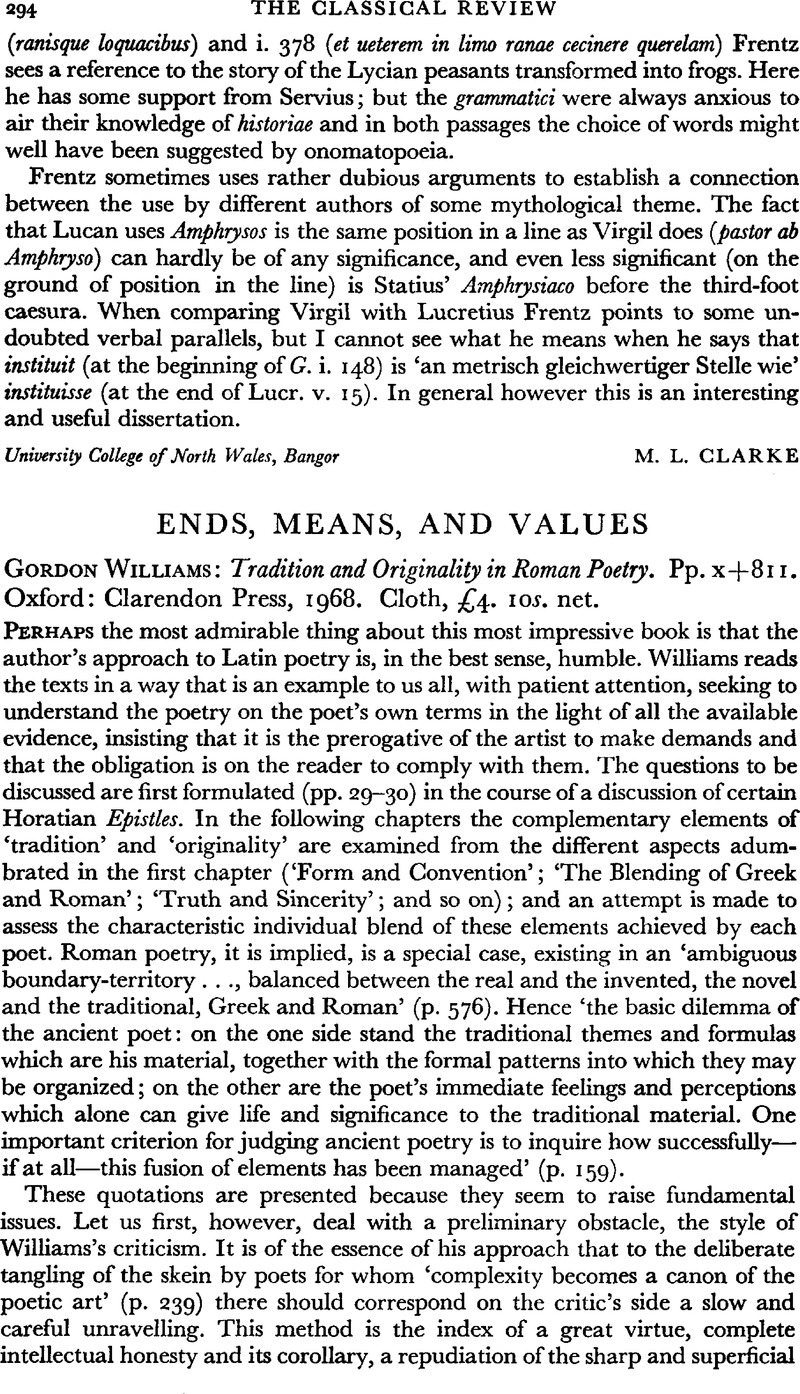No CrossRef data available.
Article contents
Ends, Means, and Values - Gordon Williams: Tradition and Originality in Roman Poetry. Pp. x+811. Oxford: Clarendon Press, 1968. Cloth, £4. 10s. net.
Published online by Cambridge University Press: 27 February 2009
Abstract

- Type
- Reviews
- Information
- Copyright
- Copyright © The Classical Association 1969
References
page 296 note 1 See the valuable remarks of J.C. Bramble in Farrago (Journal of Cambridge University Classical Society), no. 5 (1969), 3–4.
page 296 note 2 Cf. E. W. Leach, ‘Georgic Imagery in the Ars Amatoria’, T.A.P.A. xcv (1964), 154; contra, for the error as the real offence, R. Rogers, ‘The Emperor's displeasure and Ovid’, ibid, xcvii (1966), 373–8.
page 296 note 3 Cf. W. Marg, Atti del convegno internazionale ovidiano, ii (1959), 345–54 (= Ovid [Wege d. Forsch. xcii, 1968], 502–12); Kenney, Proc. Camb. Phil. Soc. N.S. II (1965), 39–41 (= Ovid. 517–22). I am now disposed to think that Marg may if anything have underrated the animosity displayed towards Augustus.
page 297 note 1 There is not space to go into Williams's discussion of the invocation of Venus (pp. 143 ff.), which I find profoundly unsatisfying. His stylistic judgements of certain limited contexts (pp. 717, 786) are helpful.
page 297 note 2 Williams sees indignation at Odes iii 19. 1–8 (p. 115), ‘outspokenness’, ‘frank sensuality’, and ‘abandon’ at ii. 12. 25–8 (pp. 299 ff.). I confess that I am harder move.
page 297 note 3 This latter poem is said to be among those which ‘take new poetic life’ from the use of peculiarly Catullan imagery; but what is a reader supposed to make of the poem as a whole? One would like to see Rudd's note (T.A.P.A. xc [1959], 338–42) at least mentioned, if only so that Williams (whose silence one does not know how to construe) could refute it.
page 298 note 1 But it is a pity that there is no reference to Kidd's excellent article in AUMLA 20 (1963), 298–308Google Scholar. In general the bibliography seems excessively selective, though one recognizes that in a book of this range some restrictions must be imposed. The German sources that Williams cites will for the most part be a closed book to his student and unprofessional readers, and it would have been a kindness to offer them more secondary English material. To take a single instance, apropos of trajections (pp. 714ff.) it might have been useful to cite Postgate, ‘Flaws in Classical Research’, Proc. Brit. Acad. iii. Cf. the preceding note.
page 298 note 2 One small but to me intensely irritating pin-prick is the spelling ‘Juppiter’, which combines pedantry with incorrectness. Some body at the Clarendon Press should really have put his foot down about this!


